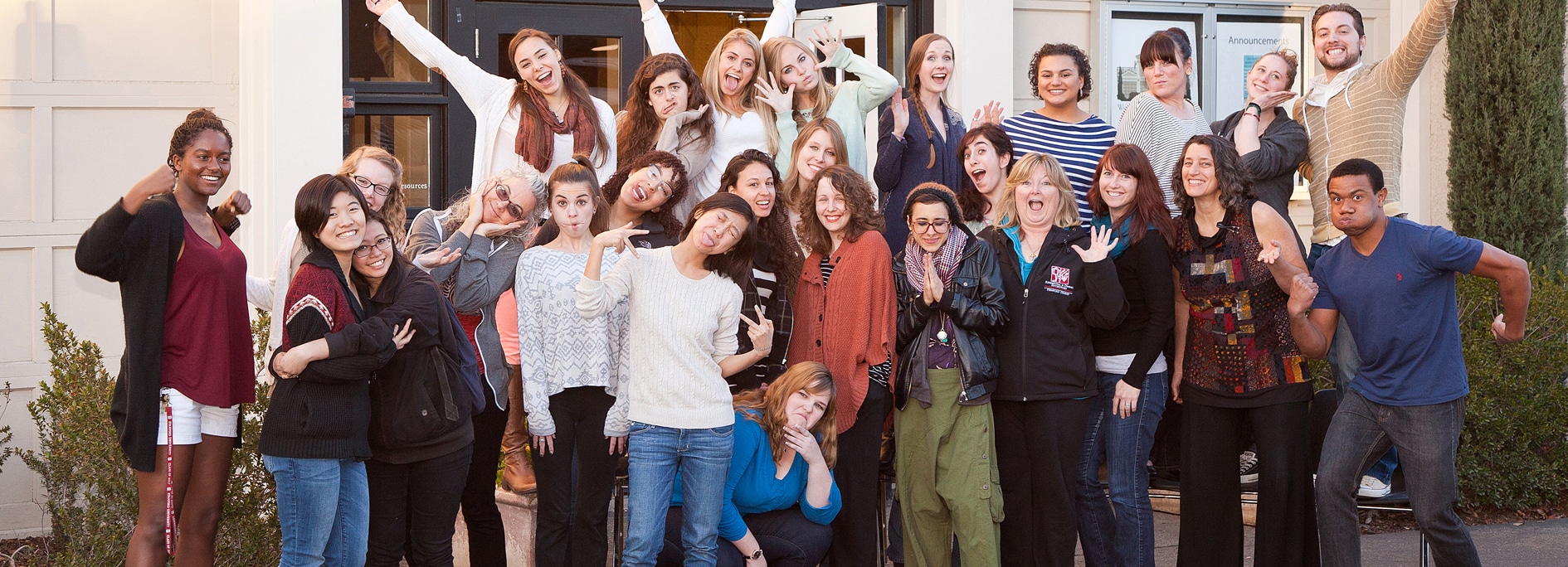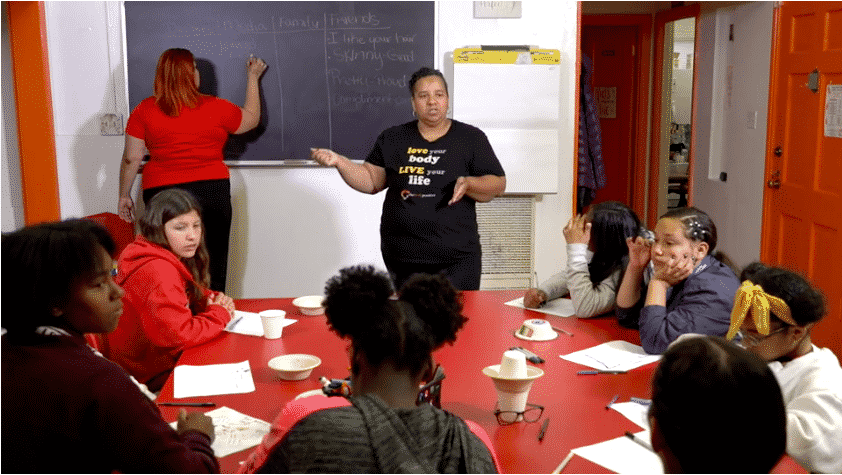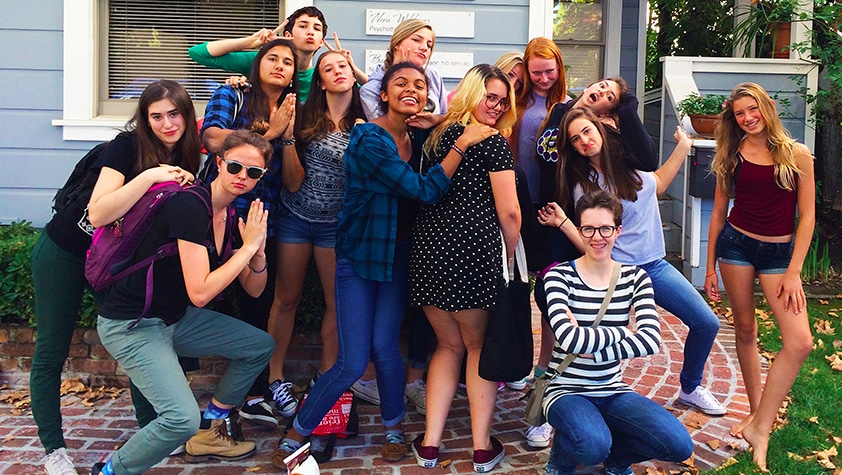
Be Body Positive Training for Educators and Students Leaders
“Schools are uniquely positioned to play a part in this increasingly significant public health issue [eating disorders] that has the second highest mortality rate of any mental health disorder.” 1
—Chevese Turner, Former Chief Strategy & Policy Officer of the National Eating Disorders Association
- ✔️ Take the Fundamentals Home Study Course to learn The 5 Competencies of our Be Body Positive Model
- ✔️ Become a licensed Be Body Positive Facilitator and teach our group curriculum in middle schools, high schools, colleges, and youth programs. Learn more about the training and curriculum
- ✔️ Transform the lives of adolescents with our new Be Body Positive Classroom Curriculum for middle schools
ANNOUNCING OUR NEW MIDDLE SCHOOL CLASSROOM CURRICULUM!
It is well documented that children are struggling with their bodies at younger and younger ages, an issue that has been exacerbated greatly by the COVID-19 pandemic. We responded to this health crisis by creating our new Be Body Positive Classroom Curriculum for middle school educators. This body-oriented, trauma-informed Social Emotional Learning curriculum is a powerful collection of 30-minute lessons that teach students to love and care for their bodies, respect the diverse bodies of their peers, and to be resilient against criticism and aggression from others. This culturally sensitive curriculum is guided by social justice as a core value.
WHY WE NEED YOU TO BECOME A LICENSED BE BODY POSITIVE LEADER
Each month, one million children engage in risky behaviors in an attempt to control their weight.2
When young people are preoccupied with their bodies, it hinders their self-esteem, relationships with others, performance in school, and overall life quality.
The world is changing faster and in ways we’ve never seen before. While no one can know the full impact all of this will have on humans as a collective, one thing is clear: young people, who already struggle to feel connected to their changing selves, are having even more disruptions with food, body image, and self-care.
- 44% of teens skip meals as a tactic to losing or controlling weight3
- African American teenagers are 50% more likely to exhibit bulimic (binge and purge) behaviors than white teenagers.4
- More than half of lesbian, gay, bisexual, transgender and queer young people between the ages of 13 and 24 have been diagnosed with an eating disorder at some point in their life.5
- Hispanic adolescents were significantly more likely to have bulimia nervosa than their non-Hispanic peers.6
- Body Image Disturbance is a predictor for depression, low self-esteem, alcohol and drug abuse, eating disorders, and sexual assault.7-12
GET TRAINED BY THE BODY POSITIVE TO HELP US CHANGE THIS TROUBLING REALITY
We offer experiential, online leadership training for initiating powerful Be Body Positive programs in middle schools, high schools, colleges, and youth programs. Our compelling training and research-supported curriculum will prepare you to establish an environment (whether in-person or online) for students to bravely explore their beauty, health, and identity, and the societal conditions that can lead to disruptions in embodiment.
Get licensed by us to teach The 5 Competencies of the Be Body Positive Model to address the self-destructive, isolating struggles many students experience with their body image, eating, and exercise. We will support you in creating a Body Positive program that is tailored to meet the specific needs of the population you serve.
Our online Be Body Positive Facilitator Training offers:
- A lifetime license to use our comprehensive Facilitator Manual and Group Curriculum with step-by-step instructions for teaching our powerful Competencies.
(Download a sample of the curriculum.) - Newfound confidence and invaluable skills to work with young people who struggle with eating and body image problems.
- Education about the impact of intersecting identities on body image and self-care.
- A personally transformative experience for facilitators as they enhance their relationships with their own bodies and self-care.
- Access to our private Facilitator Facebook group, monthly cohort calls, and a Resource Bank updated regularly with relevant and inspiring content.
Click below for more information about bringing The Body Positive to:
1 Adams Introduces Bipartisan Bill on Eating Disorders in Schools [Press release]. (2020, May 7). Retrieved June 23, 2020, from https://adams.house.gov/media-center/press-releases/adams-introduces-bipartisan-bill-eating-disorders-schools
2 Ibid.
3Teens & Body Image…Changing the World. (n.d.). Retrieved June 23, 2020, from https://www.stageoflife.com/TeensandBodyImage.aspx
4Goeree, M. S., Ham, J. C., & Di Iorio, D. (2011). Race, Social Class, and Bulimia Nervosa. University of Zurich, working paper series, 1-31. doi:10.5167/uzh-64072
5Brammer, J. (2018, March 02). Over half of LGBTQ youth have been diagnosed with eating disorder, survey finds. Retrieved June 23, 2020, from https://www.nbcnews.com/feature/nbc-out/over-half-lgbtq-youth-have-been-diagnosed-eating-disorder-survey-n852621
6https://www.nationaleatingdisorders.org/people-color-and-eating-disorder
7Forrest, K.Y., & Stuhldreher, W.L. (2007). Patterns and correlates of body image dissatisfaction and distortion among college students. American Journal of Health Studies, 22(1), 18-25.
8Grossbard, J.R., Lee, C.M., Neighbors, C., & Larimer, M.E. (2009) Body image concerns and contingent self-esteem in male and female college students. Sex Roles, 60, 198-207.
9Lowery, S.E., Kurpius, S.E.R., Befort, C., Blanks, E.H., Sollengerger, S., Nicpon, M.F., & Huser, L. (2005). Body image, self-esteem, and health-related behaviors among male and female first year college students. Journal of College Student Development, 46(6).
10Johnson, F., & Wardle, J. (2005). Dietary restraint, body dissatisfaction, and psychological distress: A prospective analysis. Journal of Abnormal Psychology, 114(1), 119-125.
11Cooley, E., & Tora, T. (2001). Body image and personality predictors of eating disorder symptoms during the college years. International Journal of Eating Disorders, 30, 28-36.
12Holzhauer, C.G., Zenner, A., Wulfert, E. (2016). Poor body image and alcohol use in women. Psychology of Addictive Behaviors. 30(1), 122-7.




